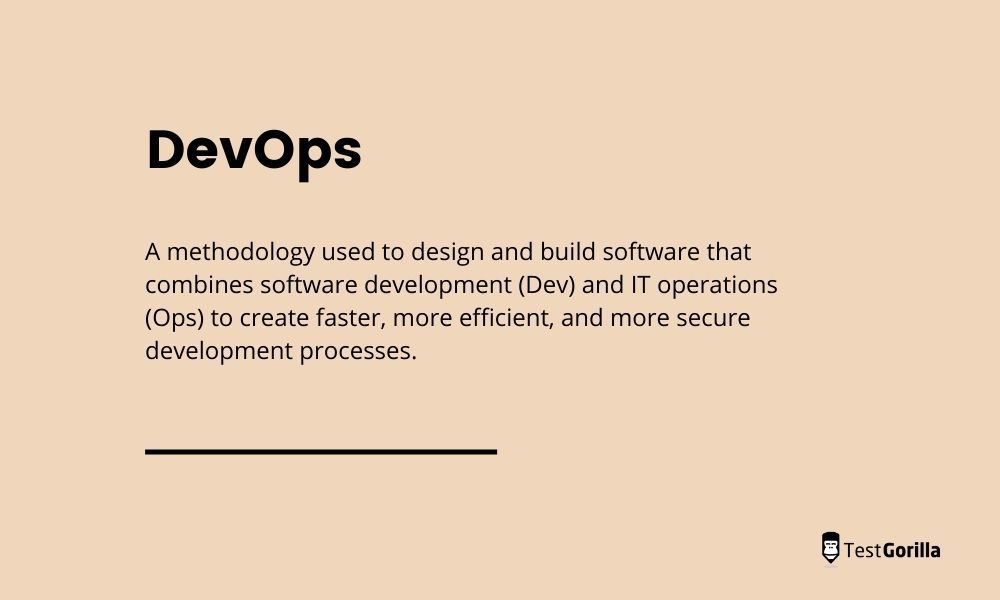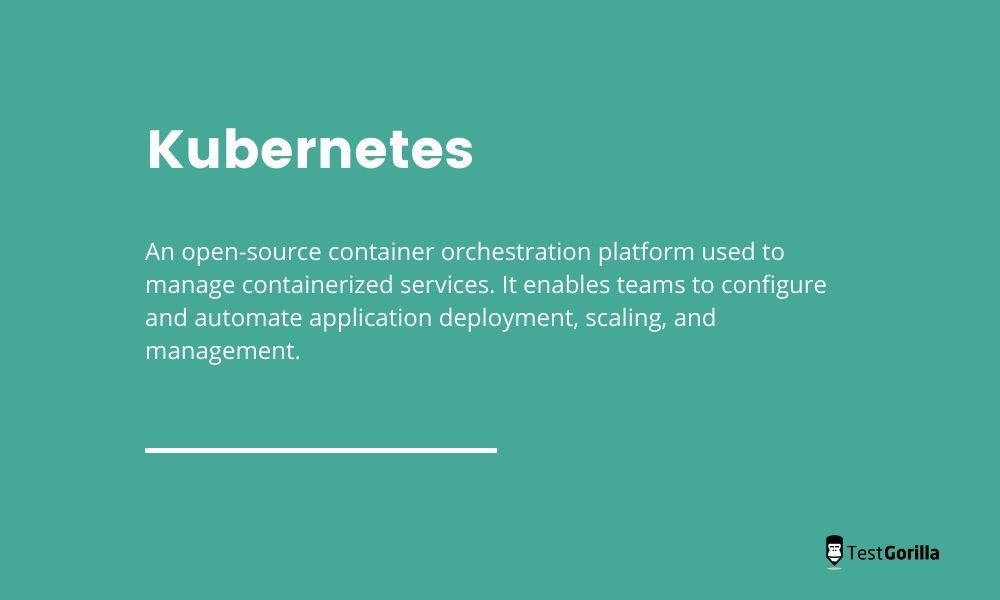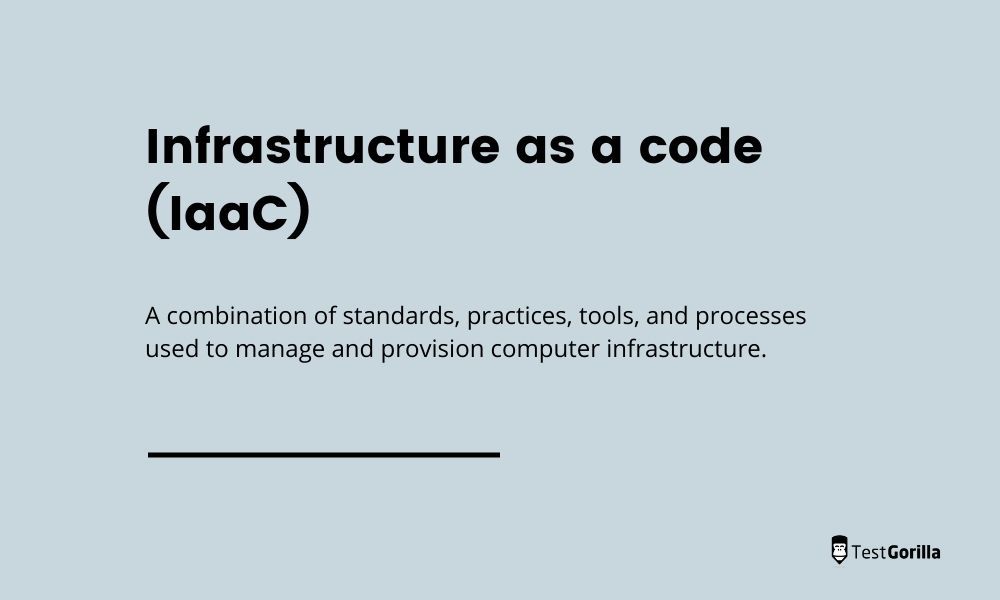Kubernetes and DevOps are often mentioned together, but do you know the role that each one plays in the development process? Do you know how they’re used together?
And most importantly, do your candidates know how to use Kubernetes in a DevOps environment?
If you’re looking to hire an expert proficient in Kubernetes and DevOps, you’re probably wondering what the best method is to assess their skills and knowledge – and you may also be considering how to do that in the fastest and most efficient way possible.
After all, global talent shortages make it more and more challenging to hire expert talent, especially with such in-demand skills as DevOps and Kubernetes.
However, you’ve come to the right place.
This article explains the role Kubernetes plays in DevOps, and also shows you how to use a skills assessment featuring a Kubernetes and a DevOps test to optimize your recruitment process and hire the best talent at a fraction of the time compared with standard hiring methods.
But first, let’s quickly explain the basics.
Table of contents
What is DevOps?
DevOps is a methodology used to design and build software that combines software development (Dev) and IT operations (Ops) to create faster, more efficient, and more secure development processes.
In DevOps, different teams work together to design, build, and deploy software quickly by using key principles such as:
Automation
Rapid iterations
Containerization
Agility
DevOps helps businesses adapt to change and shorten the development and delivery cycles when working on new projects and applications. This allows for an important competitive advantage in highly competitive industries, such as tech, software, and banking.
Common DevOps tools include Kubernetes, Azure DevOps, Docker, Ansible, Splunk, Nagios, Jira, Jenkins, DataDog, Prometheus, and more.
What is Kubernetes?
Kubernetes, also known as K8s, is an open-source container orchestration platform used to manage containerized services. It enables teams to configure and automate application deployment, scaling, and management.
Kubernetes was created by Google but is currently managed by the Cloud Native Computing Foundation.
Kubernetes enables containerized deployments that are more flexible, secure, and cheaper than traditional or virtualized deployments.
What are the benefits of Kubernetes?
Kubernetes helps teams:
Automate containerized deployments and environments
Scale deployments up or down according to their needs
Reduce deployment costs
Be faster and more productive
Ensure zero-downtime deployments
Additionally, developers can easily contact others working with Kubernetes: Dedicated open-source communities exist across the platform.
What role does Kubernetes play in DevOps?
Now that we’ve considered what DevOps and Kubernetes are, we need to understand how the two interact.
How can Kubernetes be used in DevOps processes? What’s the added value it provides to DevOps teams?
As companies started using the DevOps framework, teams needed to learn to work with diverse tools without breaking software development pipelines – or having to rebuild them each time a new tool was added.
Containers were the perfect solution to this problem: They package the code and all dependencies in a containerized environment, using microservices in a modular infrastructure.
This enabled teams to create flexible pipelines without disrupting development and deployment processes by using the principle of CI/CD, or continuous integration and continuous deployment.
This approach, however, brought new issues related to orchestration, management, and scalability.
Kubernetes enables the automation of containers’ deployment, scaling, and management, which helps DevOps teams move faster and build more scalable and secure applications. It uses infrastructure as a code (IaaC) and enables the creation of on-demand infrastructure.
Containerized deployments are more reliable, as the risk of downtimes is eliminated, and software updates and rollbacks are also much easier to perform.
How can you hire top DevOps experts with the right Kubernetes skills?
Here’s a comprehensive step-by-step guide for hiring a DevOps expert with the right Kubernetes skills.
This will help you speed up your hiring process and make it more efficient, while also reducing the risk of making costly hiring mistakes.
Here’s how to hire your next DevOps pro with excellent Kubernetes skills:
1. Write a detailed job description.
This is the foundation of your hiring process and an important step that you shouldn’t skip – even if you feel tempted to jump to the job ad straight away.
Kubernetes developer job descriptions are more detailed than job ads and are used internally to make sure everyone from the hiring team is on the same page. You should include the required skills and knowledge, as well as list skills that are nice to have.
2. Create a job ad and post it on job boards and social media channels.
Based on your job description, write a job ad to outline the position and sell it to prospective employees. Post the ad on specialized job boards, on your website, and across social media channels.
3. Prepare a skills assessment.
Next, you need to get ready to evaluate your applicants’ skills. The best way to do this is to use a skills assessment at the beginning of the process, followed by interviews of your most promising candidates.
Skills assessments enable you to quickly identify candidates who have the right skills to succeed in the role and disqualify unsuitable applicants.
Based on your job description, choose up to five skills that your future employee must have, and use a skills testing platform like TestGorilla to build your assessment. Make sure to include a Kubernetes and a DevOps test.
4. Invite applicants to take the assessment
Once you’ve built your assessment, you need to invite your applicants to complete it. Provide them with enough information about the tests and your recruitment process to improve candidate engagement.
You can use this as a faster, more efficient alternative to CV screening: Skills assessments eliminate the unconscious bias and guesswork from hiring and enable you to evaluate candidates’ skills objectively.
5. Analyze results and shortlist your best candidates.
Once applicants complete the assessment, it’s time to look at their results and see who has the right skill set for your role. If you’re using TestGorilla, you can easily compare the results and see the details of each applicant’s scores, helping you make an informed decision.
6. Conduct interviews.
Interviews are the most resource-intensive part of the hiring process. But with the help of skills assessments, you can limit the interviews to those you know have the right skills to succeed.
For the best results, use structured interviews, and ask candidates a mix of DevOps and Kubernetes interview questions.
7. Compare notes with the rest of your hiring team and make a hiring decision.
At this point, you’ll have plenty of information about each applicant to make the right hiring decision. Look at the interview and test results and discuss them with the rest of your hiring team.
8. Extend a job offer and inform unsuccessful applicants.
Extend a job offer to the best candidate and negotiate conditions and a start date. Remember to let your unsuccessful candidates know that you haven’t retained their applications.
Many companies don’t bother doing this, without realizing that it’s the number one reason behind negative candidate experiences, according to the Human Capital Institute.
9. Onboard your new hire.
Thanks to all the data you’ve collected during the recruitment process, you’ll be able to create an onboarding process tailored to the needs of your new hire.
You can even use skills tests again to evaluate their skills in the future and see the progress they’re making, helping you seize upskilling opportunities.
Hire the right DevOps and Kubernetes talent – without losing sleep over it
As you can see, with the right tools in your recruitment toolbox, hiring the right people can be significantly easier and less stressful than with outdated hiring practices.
By using a skills assessment featuring the right tests for the role (such as a Kubernetes and a DevOps test by TestGorilla) and a good selection of interview questions, you can be sure that you’re able to make the right hiring decision, bias- and stress-free.
Related posts
Hire the best candidates with TestGorilla
Create pre-employment assessments in minutes to screen candidates, save time, and hire the best talent.
Latest posts
The best advice in pre-employment testing, in your inbox.
No spam. Unsubscribe at any time.

Hire the best. No bias. No stress.
Our screening tests identify the best candidates and make your hiring decisions faster, easier, and bias-free.
Free resources
This checklist covers key features you should look for when choosing a skills testing platform
This resource will help you develop an onboarding checklist for new hires.
How to assess your candidates' attention to detail.
Learn how to get human resources certified through HRCI or SHRM.
Learn how you can improve the level of talent at your company.
Learn how CapitalT reduced hiring bias with online skills assessments.
Learn how to make the resume process more efficient and more effective.
Improve your hiring strategy with these 7 critical recruitment metrics.
Learn how Sukhi decreased time spent reviewing resumes by 83%!
Hire more efficiently with these hacks that 99% of recruiters aren't using.
Make a business case for diversity and inclusion initiatives with this data.























